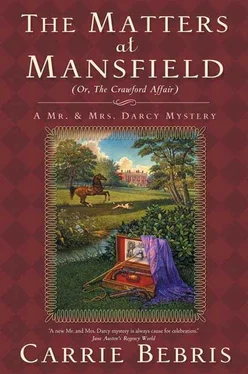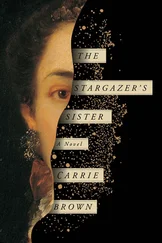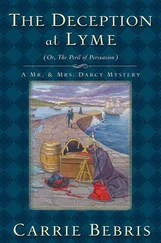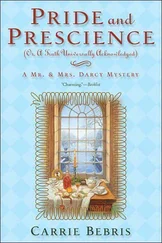“I have not been in the habit of brooking disappointment.”
—
Lady Catherine de Bourgh ,
Pride and Prejudice
“It is a pity Miss de Bourgh cannot join us this afternoon.” Lord Sennex lifted his teacup but did not sip, instead returning it to the saucer as if he could not quite remember what he had been about to do with it. Elizabeth itched to brush away the stray cake crumbs that had collected in the folds of his neckcloth. ’Twas unfortunate enough that advanced age deprived the viscount of his full faculties. Must it also compromise his dignity?
“Forgive me, your ladyship,” he continued, “but where did you say your daughter is?”
Lady Catherine had not said. Indeed, Lady Catherine had not said much over the past several days to Lord Sennex or his son about Anne’s sudden absence, even though the viscount had called each day since the ball. Darcy had sent word to his aunt that Miss de Bourgh had now become Mrs. Henry Crawford, but her ladyship refused to accept the news. Until Mr. Crawford presented himself to stand trial in the court of Lady Catherine, she would not speak of the matter.
Except to Elizabeth. In private, Lady Catherine harangued Elizabeth ceaselessly for her role in the elopement — a role Elizabeth herself yet struggled to comprehend. Culpability for the entire affair was deposited squarely on her shoulders, despite her protests of innocence. Not only did Elizabeth stand accused of all but personally conducting the couple to Gretna Green, she also bore responsibility for their ever having met in the first place. Had Lady Catherine not been forced to abandon Anne in Bath to aid the Darcys the previous autumn, her daughter would not have fallen prey to that fortune-hunting Mr. Crawford. Had Elizabeth not enticed Darcy to betray his duty, Anne would be safely married to her cousin by now. Had Elizabeth’s sister Lydia not eloped, the notion never would have entered Anne’s mind.
Were Mrs. Jenkinson still at Riveton, Anne’s former attendant could have shared Elizabeth’s accommodations in the doghouse. But the longtime servant, after disclosing all she knew about Mr. Crawford (relatively little) and the elopement (nothing at all), was summarily dismissed without references or her final month’s pay. She was expelled from Riveton with instructions to inform Lady Catherine’s solicitor of her new direction so that her belongings at Rosings might be forwarded. The poor woman had been utterly bewildered as she departed for the cottage of a sister she had not seen in five-and-twenty years. Elizabeth had given her ten pounds and assigned one of her own footmen to escort her safely to Sussex. Why she felt responsible for Mrs. Jenkinson’s predicament, she could not say. Perhaps Lady Catherine’s reproaches were beginning to find root.
Her ladyship’s prevarications with the viscount, however, clearly were not. What little information she had conveyed, Lord Sennex seemed unable to retain.
“My daughter attends to wedding-related business.” It was the same equivocation Lady Catherine had used with Lord Sennex since Anne’s disappearance, but delivered with more defensiveness — and less patience — than previously. They anticipated the return of the newlyweds sometime this day, and her ladyship grew more impatient each hour. Though she had received Lord Sennex with civility, she wanted him gone before the Crawfords appeared. She did not want any outsiders, particularly Lord Sennex or his son, to witness the reunion. They were not to know of Anne’s clandestine marriage until Lady Catherine had satisfied herself that it was incontrovertible.
Elizabeth saw little point in postponing the inevitable admission to Anne’s erstwhile fiancé. Darcy’s letter had affirmed that her marriage to Mr. Crawford was valid, and even were it not, Mr. Sennex could hardly be expected to accept Anne on the same terms as before the affair. If he accepted her at all.
“Ah, yes — gone down to London to order her wedding clothes, I imagine.” Lord Sennex nodded knowingly. “Young ladies are always so excited about that aspect of the nuptials. But why did you not accompany her? Surely Miss de Bourgh would appreciate her mother’s counsel in selecting her trousseau.”
“Anne knows my opinion of her arrangements. And if she does not, she should. Would your lordship care for more cake?”
The viscount’s eyes brightened at the invitation. As he tasted his second slice with the unreserved delight of a five-year-old, Elizabeth reflected that perhaps senility had its advantages. While others dwelt on guilt and misery, Lord Sennex found joy in cake.
A servant entered with a letter. “Mrs. Darcy, this just arrived.”
Elizabeth recognized the hand at once. She rose. “Pray excuse me, my lord. This comes from my husband, and I would read it immediately.”
He looked up from his cake long enough to nod. “Of course.”
She left the drawing room but had no sooner closed the door behind her than it opened.
“Where are you going with that?” Lady Catherine joined her in the hallway, leaving the door slightly ajar. “That letter contains news of Anne, and I will not be kept waiting to learn it.”
“What about his lordship? Would you leave your guest sitting by himself?”
“The old fool is too occupied with his cake to miss me. What does it say?”
Elizabeth broke the seal and read the opening sentences. Mr. and Mrs. Crawford would not arrive at Riveton today. Or tomorrow. Or next week.
“There has been an accident.”
“An accident?” Lady Catherine attempted to take the letter for herself. “Let me see that! What sort of accident? Is Anne injured?”
Elizabeth scanned the lines as best she could while fending off Darcy’s aunt. “A carriage accident… The mishap occurred when they stopped at an inn. Just as Anne was alighting, one of the horses suddenly reared and so jostled the chaise that she lost her balance. She fell to the ground and the carriage wheel rolled over her leg. .. The apothecary advises she not be moved.”
“Was no one handing her out? Where was that husband of hers? Does he neglect her already?”
She scanned further. “Mr. Crawford was indeed assisting her from the vehicle, and blames himself for not having been able to somehow prevent the accident.”
“The scoundrel could have prevented it by not abducting her to Gretna Green in the first place. That gentleman now has even more to answer for. And an apothecary? Has no one summoned a real physician? Where is this inn?”
“Mansfield.”
“Nottinghamshire? Whatever are they doing there?”
“No, a small village in Northamptonshire. According to Darcy, rain forced a detour from the main road. They lodge at the Ox and Bull.”
“This whole situation is cock and bull. It is time — long past time — that Mr. Henry Crawford was held accountable for it. I will brook no further delay.”
“You would have him leave his wife in her present condition to continue here?”
“No, I want him to remain precisely where he is. I am going to Mansfield. Today.”
Today suited Elizabeth just fine. The sooner Lady Catherine departed, the sooner Elizabeth would be left in peace. “Would you like me to convey your excuses to Lord Sennex?” she offered.
“No, I want you to oversee your own preparations for departure. You are accompanying me.”
To anything like a permanence of abode, or limitation of society, Henry Crawford had, unluckily, a great dislike.
—
Mansfield Park
The Ox and Bull had served as Mansfield’s only inn for seven generations. What began as a small public house had over the years expanded into a conglomerate of rooms haphazardly added as demand justified and profit allowed. The dining room had been twice enlarged to accommodate the numerous villagers who dined there; in addition, the inn now boasted eight private bedchambers, a small parlor, a communal sleeping room for servants, and stables that also functioned as the local livery. The Bull, as its regular patrons called it, sprawled rather than sat on the main road of the modest village, across the green from the church, whose tall, straight spire chided its neighbor for undisciplined deportment.
Читать дальше












